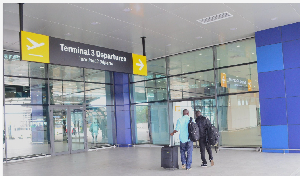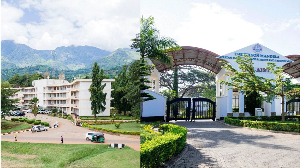In the view of NDC the 2009 Budget Statement and Economic Policy of the government is meant to promote „A Better Ghana? with real opportunities for gainful employ¬ment prosperous enter¬prise and social and economic welfare for all our people. The bud¬get pre¬sents a macroeconomic framework that is to facilitate, according to the vision of the NDC, a “…partnership between the government and the business sector towards the enhancement and promotion of national economic growth”. Notwithstanding this strong pronouncement many eco¬no¬mic analysts have found the budget to be too timid and vague on its commitment to growth. This article is a further contribution to the ongoing discourse about the growth focus of the budget.
According to the NDC “the policy thrust of the 2009 budget is to reduce the current budget deficit to sustainable levels, improve the exchange rate regime, and work towards the attainment of single digit inflation”. Indeed there is no doubt about the importance of these macroeconomic objectives but these are no end in them¬¬¬selves. They are just means for achieving long term accelerated sustainable growth, deve¬lop¬ment and poverty reduction. Thus it is always important for a government to accompany the pur¬suit of macro¬economic stability with a clear growth agenda, which unequivocally delineates how econo¬mic activity and production are to be organised.
Macroeconomic stabilization generally involves ensuring price stability, high employment, eco¬nomic growth, foreign account and fiscal equili¬brium. The two most important economic arse¬nals for ensuring such a stability include fiscal and monetary policies. They are important beca¬use they affect directly or indirectly consumption, investment, government spending, credit, inte¬rest rates, etc., which in themselves affect economic growth and employment and poverty levels. On the sur¬face most economists would appropriately recom¬mend a deflationary fiscal policy measure to reduce fis¬cal and current account deficits. This entails increases in taxes, reduction in govern¬ment expenditure or both.
In any case either of these measures is likely to reduce the level of demand in the economy and consequently the level of economic growth. This is the so-called trade-off between fiscal (or price) sta¬bility and output (or employment) growth. To counter any such possible contraction in output or slow down in economic growth and consequently an increase in unemployment ema¬na¬ting from attempts to reduce fiscal deficits many economists usually recommend an expansion¬ary mone¬tary policy in the form of interest rate cuts to encourage business investment. Very often many governments support this policy with special growth enhancing packages to boost output expan¬¬sion and private sector initiatives such as business tax cuts and other measures to reduce the costs of production. The essence of such a policy is to realign resources from the government to the private sector to boost output expansion and employment. The challenge therefore for govern¬ments facing rising budget deficits is how to convert this trade off into a win win situa¬tion of fall¬ing fiscal deficits, rising output growth and employment.
Let us now see how the 2009 budget deals with growth issues in its attempt to reduce the fiscal defi¬¬cit. The budget identifies “the main strategies” to reduce the fiscal deficit “…. to include enfor¬ce¬ment of fiscal discipline, significant reduction in unproductive recurrent expenditure and impro¬vement in revenue generation (including dividends from state owned enterprises)”. On the expen¬diture side the 2009 budget programmed nominal increases of only 2.57 percent in total outlay of resour¬¬ces required by the government to fulfil its functions, which by a projected infla¬tion rate of 15.3 percent would possibly lead to a substantial decline in real expenditure. Indeed this is a defla¬tion¬ary policy whose consequence is likely to lead to a decline in aggregate demand and economic growth. This possibility is also underscored by the programmed decline of nominal government dis¬¬cretionary spending by 5.59 percent for the year. The deflationary effect on growth of such a decline in this spending category, which includes investments, administration and service and actually drives domestic aggregate demand for goods and services, would be felt much in real terms, given the projected expected inflation of about 15.3 percent.
Indeed the effect of this deflationary fiscal policy is likely to be compounded by equally deflatio¬nary trends in the mone¬tary policy, which raised the Bank of Ghana prime rate (a major determi¬nant of lending interest rates of commercial banks) by about 1.5 percentage points to almost coin¬cide with the pre¬sentation of the budget. By implication these measures constitute a direct strangu¬la¬¬tion of eco¬no¬mic growth from both the fiscal and monetary fronts. The concerns about the defla¬tio¬¬nary impact of government’s monetary policy appear also to be accentuated by government’s inten¬tion to increase its projected domestic borrowing by 20.8 percent in 2009. Given the already satu¬ra¬ted nature of the financial market and the pursuit of a restrictive programmed money supply policy this measure indeed is likely to fuel speculation of imminent increases in interest rates and thereby, shift resources from the real sector to the bonds market. The by-product of such a policy is likely to be a pos¬sible crowding out of the private sector from the investment credit market accom¬panied by a fall in the output of the real pro¬duc¬tive sector.
On the revenue side the 2009 budget does not offer much new ideas on aggressive mobilization of reve¬nues to finance any possible increases in government spending. It contains only two new direct mea¬sures to enhance tax revenue mobilization: i.e., an increase in the airport tax and the restoration of import duties on rice, wheat and cooking oil which were removed by the previous government at the height of the food crises in 2008, but the bill to the latter effect has even been withdrawn from parlia¬ment. Apart from these two new revenue enhancements the budget limits itself to only reiteration of emphasis on ongoing reforms in tax administration, rationalization of tax exemp¬tions and subsidies and cash management. These measures alone without new measures that directly and aggressively mobilise revenue into government chest would not bring about the badly needed fiscal consolidation to finance any extra government investment spending.
Indeed revenue mobilization efforts of the government would face serious hurdles, given its unwil¬lingness to use the most effective, elastic and buoyant tax instrument, the petroleum tax, it has, beca¬use of politics. Already the revenue side of the budget would be forfeiting, by the govern¬ment’s own conservative estimation, over GH¢50-75 million in lost petroleum revenues for 2009, due to the reduction in tax components of the petroleum prices introduced with the budget, just to keep faith with voters.
On the other hand the economic growth perspective of the budget appears to be challenged by the appa¬rent silence on spe¬ci¬fic measures to boost private sector competitiveness or development, whose output expansion could compensate for the decline in output due to the deflationary fiscal and monetary policy. The rela¬tive silence on the role of the private sector in the organization of economic activity and in achieving growth ema¬na¬tes from the ambiguous stance of the NDC on the private sector and its ideological difficulty to accept the private sector as an economic engine for wealth creation, employment generation and poverty reduction in a market economy like Ghana. Con¬strained by its socialist ideological inclinations, it is therefore unable to clearly define the appropriate role for the private sector to play in achieving its objective to lead Ghana into a middle income eco¬no¬my. Despite the wide recognition that that the driving force behind every sustainable eco¬no¬mic growth is a more dynamic, innovative and vibrant private sector, which is capable of com¬peting in the global market, the NDC’s economic medium term framework assigns only a partnership role to the private sector. It outlines this in the budget that the govern¬ment in pursuit of its medium term vision will “…forge a partnership between the government and the business sector, to enhance and promote national economic growth”, but does not elucidate how it intends to operationalise this partnership. Advisedly the budget talks about the pursuit of a growth objective “…through proper coordination of related policy areas in the real sector such as: … expanded deve¬lop¬ment of production infrastructure in, among others, energy, transport, water and communications; creating employment, through support for micro small and medium enterprises of various categories; mo¬der¬ni¬zing agriculture and the rural economy; “resuscitating manufacturing activities; etc.,”.
It is, however, not clear how this growth objective can be achieved without consequent promotion of the private sec¬tor or as the short-term macroeconomic policies in the budget purports to accomp¬lish it, through just “…encouraging the pri¬vate sector to participate in our accelerated growth agen¬da through Public Private Partnerships (PPPs)”. It is similarly vague to expect “government com¬mit¬ment and the 2009 policy thrust” to implement a growth agenda through the government part¬ner¬ing “… the private sector to provide the necessary enabling policy environment and incentives for both enterprise growth and the efficient and effective delivery of public services”. Reading bet¬wee¬n the lines of the 2009 budget, it appears that the government is going to be made the prime mover of economic activity. But where is the funding going to come from?
This approach is, however, in stark contrast with that of the NPP, which faced similar, if not more serious chal¬lenges, when it assumed the reigns of power in 2001. Unlike the NDC’s maiden budget of 2009, which lacks policies to promote con¬su¬mer and business confidence so as to raise econo¬mic growth and employment as well as reduce poverty, the NPP in its maiden budget initiated tar¬g¬e¬ted policies to jump-start the stalled economy. On the expenditure side the NPP 2001 budget pro¬¬grammed nominal increases in total outlay to fulfil its functions of about 39.41 percent as against 2.57 percent of the NDC in 2009. The statutory and discretionary expenditures were programmed initially to grow by about 66.98 percent and 15.09 percent in 2001 respectively. After taking the bold ini¬tiative to apply for the HIPC facility, the government revised these expenditure target increases in a supplementary budget during the year to 19.80 percent and 42.49 percent to favour the economic productive sectors respectively. On the other hand the nature of these tax instruments and their increases ensured that the measures did not work deflationary on the economy.
On the revenue side the NPP government, unlike the NDC that currently faces a credibility dilem¬ma because it promised in its manifesto not to raise taxes, did not hesitate in 2001 to embark upon an aggressive revenue mobilization drive to raise financing for its programmed increased expendi¬ture. Whilst taking tax administrative reforms to new higher levels, the NPP introduced, among others, new taxes such as the imposition of 5 percent import duties on zero-rated imports and for raw materials for manufacture, and processing of or prospecting for timber; the National Recon¬s¬tru¬c¬¬¬tion Levy between 7.5-10 percent on company earnings of banks, pension funds, insurance and other companies; a 1 percent processing fee on all exempt imports; imposition of 12.5 percent VAT on exempt pharmaceutical imports; etc. It also revised upward the airport tax by 150 per¬cent, the withholding tax by 50 percent, fees and char¬ges for government services, etc. In addition the 2001 budget also removed tax exemptions on all NGO imports, raised petroleum taxes through a 67 percent increase in prices of petroleum products, reviewed all tax holidays under the GIPC law and redu¬ced the VAT threshold from GH¢20,000 to GH¢10,000. All these measures, coupled with savings from debt reliefs, enabled the government to raise increased revenue to finance its intended increa¬sed spending and to reduce the budget deficit of 2000 by about 48 percent to 4.4 percent of GDP in 2001. On the monetary front the government, as a result of improved revenue collection, managed to shift the financing of the budget deficit from bank to non-bank and foreign sources and thereby redu¬ced any possible crowding out effect of the budget. In 2000 whe¬reas 52.9 percent of the bud¬get deficits were financed by borrowing from the banking sector, in 2001 68.3 percent of the bud¬get deficits were financed from external borrowing; 26.9 percent was net domes¬tic bor¬rowing (non-bank sector) and 4.8 percent from divestiture receipts. This together with a 41.3 percent increase in money supply during 2001 eased the pressure on interest rates for its equivalent to fall from 42 percent to 29.7 percent during that year.
With an economic vision founded on the operation of a liberal and market-based economy, the NPP was absolutely clear on its relationship with the private sector. It underscored its intention to vigo¬¬¬rous¬ly promote the private sector by ensuring that “the 2001 budget aims at laying the founda¬tion for a robust economic growth with the private sector as the main agent for wealth creation, … prin¬¬cipal source of economic growth, the generator of employment opportunities, and the creator of the resources wherewithal for social progress”. The government consequently declared an era of “gol¬den age of business” with strong emphasis on private sector development. To give credence to its intentions it created a “Ministry for Private Sector Development” to ensure coordination of sec¬to¬ral efforts aimed at eliminating bureaucratic restrictions and impediments and to promote posi¬tive attitudes towards entrepreneurs. The results is a substantial improvement in Ghana’s global rank¬ing on the international index of “Ease of Doing Business” from 138 in 2001 to 87 in 2008 out of 178 countries to become the top reformer in Africa. The budget also announced the downward revision of marginal corporate tax rates from 35 percent to 30 percent for companies listed on the Ghana Stock Exchange and to 32.5 percent for unlisted companies and of income tax rates from 35 percent to 30 percent and 25 percent to 20 percent as well as widened income tax bands to enhance incentive to high performance to firms and workers. It also refocused the “…Divestiture Implementation Programme as a sign of the government’s strong commitment to the development of the private sector”. Subsequently barely 4 months on assumption of power the NPP government organised, on May 14-15, 2001, a National Economic Dialogue to seek consensus and active participation of the private sector in economic development of the country.
It discerns from the above that, even though the economic outcomes of the 2000 and 2008 election years bear several similarities, the policy frameworks for macro¬economic stability and growth of the respective governments that assumed the reigns of political power differ quite substantially. In 2001 the NPP adopted a macroeconomic stabilization course backed by a clear reflationary action frame¬work which used the private sector as the catalyst for accelerated growth. In 2009, however, the NDC appears to adopt a macroeconomic stabilization course, which seems deflationary in growth orientation and lacks internal consistency to sustain the recent rising socio-economic gains in Ghana.
Kojo Appiah-Kubi (PhD) Published in Daily Graphic
Opinions of Saturday, 4 July 2009
Columnist: Appiah-Kubi, Kojo














